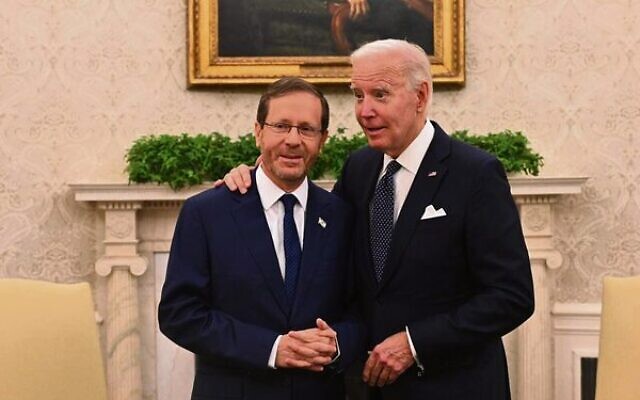Herzog officially set to address US Congress
The invitation to address Congress was extended to Herzog when he was in Washington last October by US Speaker of the House of Representatives Nancy Pelosi and Schumer. Herzog met with Pelosi during that trip and also with Biden at the White House.
(TIMES OF ISRAEL) – ISRAELI president Isaac Herzog will address a joint session of Congress in Washington, DC, on July 19, leaders of both US parties announced last Thursday. Herzog’s office also confirmed the plan.
A message from House Speaker Kevin McCarthy, Senate Majority Leader Chuck Schumer, Senate GOP leader Mitch McConnell and House Democratic leader Hakeem Jeffries said the visit will “commemorate the 75th anniversary of the statehood of Israel and reaffirm the special relationship between our two nations.”
Herzog is expected to also meet with US President Joe Biden and will meet with Jewish leaders in New York City, where he will spend Shabbat.
It will be Herzog’s second visit to the White House in less than a year, while Prime Minister Benjamin Netanyahu has yet to be invited to meet with Biden since winning the Israeli elections in November, causing some tension.
Herzog’s office told The Times of Israel that the invitation to meet with Biden was made in November. The invitation to address Congress was extended to Herzog when he was in Washington last October by US Speaker of the House of Representatives Nancy Pelosi and Schumer. Herzog met with Pelosi during that trip and also with Biden at the White House.
Netanyahu has yet to receive an invitation to visit the White House, six months after entering office, amid tensions with Washington over his government’s intensely divisive efforts to curb the power of the courts and hand greater authority to the executive.
Earlier this month, during an interview with the UK’s Sky News, Netanyahu was asked about the delay in being invited to meet Biden and responded, “It will come.”
In a Wall Street Journal interview last Thursday, Netanyahu said that US–Israel relations remain strong despite the lack of a White House invitation. “I think it may take some time, but I think, of course, I should expect to meet President Biden,” Netanyahu said.
Netanyahu said this week that he will visit China, in what some view as a signal to Washington that Israel has other diplomatic options.
Tamir Hayman, director of the Institute for National Security Studies, said on Tuesday that a visit to China would be a “serious mistake”.
Hayman, a former IDF intelligence chief, wrote on Twitter that such a trip by Netanyahu is “terrible timing both tactically and strategically”, adding that “The special relationship with the US is in danger. This act could definitely cause damage.”
Former IDF military intelligence chief Amos Yadlin, who is believed to be close with parts of the American defence establishment, said the move appeared to be aimed at imitating Saudi Arabia, after China brokered a rapprochement between the kingdom and Iran – an agreement seen as a signal by Riyadh that it has other diplomatic options as the US pivots away from the Middle East.
“This is a step that will harm Israeli interests and not advance them,” Yadlin wrote in a series of tweets. “If someone in the prime minister’s circle thinks it’s smart to act like [Saudi Crown Prince Mohammed] bin Salman and travel to China to annoy Biden and show him that Israel has another strategic option, he’s making a serious mistake and doesn’t understand the importance of the competition between the geopolitical superpowers of the 21st century.”
Yadlin noted that unlike Israel, Saudi Arabia does not receive billions annually in US military assistance, does not depend on an American veto at the UN Security Council, is not reliant on US financial guarantees and does not have the most advanced American weapons systems.


comments